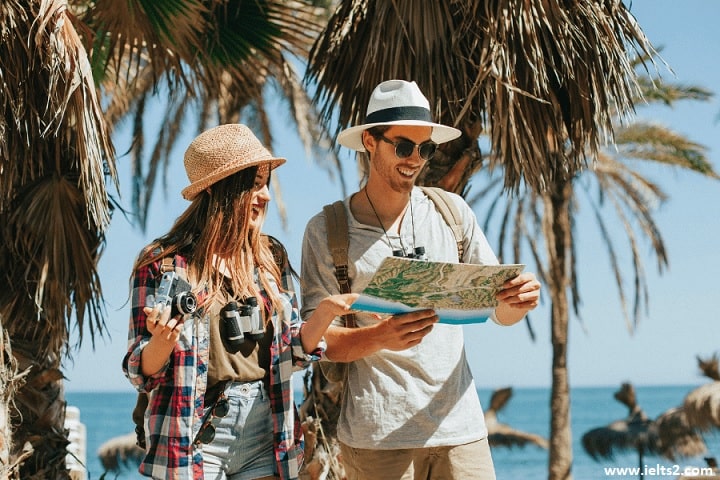نمونه سوالات اسپیکینگ آیلتس درباره مسافرت (پارت 1 2 3)
IELTS Speaking Questions with Band 9 Answers about Travelling
در این بخش بیش از 20 نمونه سوالات اسپیکینگ آیلتس نمره 9 از آخرین سوالات گزارش شده از سنترهای ایرانی و خارجی برگزار کننده آیلتس مربوط به پارت 1، 2 و 3 درباره موضوع “مسافرت” را برای شما فهرست کرده ایم. در ادامه همچنین نکات گرامری، لغات و دلایل دریافت نمره 9 را توضیح داده ایم. 1000 نمونه سوالات اسپیکینگ آیلتس با جواب PDF پارت 1 2 3 پیشنهاد بعدی ما به شما عزیزان است.
نمونه سوالات اسپیکینگ آیلتس درباره موضوع مسافرت (پارت 1)
Questions and Model Band 9 Answers for IELTS Speaking Part 1 (Topic: Travel)
1. Do you like traveling? Why or why not?
Absolutely! Traveling allows me to escape daily routines and explore new cultures. I find it incredibly enriching to experience different cuisines, traditions, and landscapes. It’s also an opportunity to meet new people and broaden my perspective. For instance, during a trip to Italy, I learned about the intricate history of Rome and developed a deep appreciation for art. Traveling also rejuvenates my mind and inspires creativity, making it a truly rewarding experience.
2. How often do you travel?
I try to travel at least twice a year, usually during my vacations. These trips are either international adventures to explore different cultures or domestic journeys to unwind in nature. For instance, I recently visited a serene mountain retreat, which was a perfect escape from the city’s hustle and bustle. Traveling regularly helps me relax, recharge, and return to my responsibilities with renewed energy and motivation.
3. Do you prefer traveling alone or with others? Why?
I enjoy both, depending on the purpose of the trip. Solo travel offers unparalleled freedom, allowing me to follow my own pace and interests. On the other hand, traveling with friends or family enhances the experience through shared memories and connections. For instance, a group trip to the beach becomes more enjoyable with games and laughter. Each style of travel has its own charm.
4. What is your favorite type of holiday destination?
I love visiting coastal destinations. The combination of sun, sand, and sea is incredibly relaxing. For example, a recent trip to Bali offered stunning beaches, vibrant marine life, and opportunities for water sports like snorkeling. The soothing sound of waves and the fresh ocean breeze create an unparalleled sense of tranquility. Coastal destinations always leave me feeling refreshed and rejuvenated.
5. Do you plan your trips in advance or prefer spontaneous travel?
I usually plan my trips in advance to ensure everything runs smoothly. Researching accommodations, activities, and local attractions helps me make the most of my time. For instance, when visiting Paris, I pre-booked tickets to the Louvre and the Eiffel Tower to avoid long queues. However, I leave some room for spontaneity to discover hidden gems, making the trip more enjoyable and balanced.
6. What is the most interesting place you have visited?
The most fascinating place I’ve visited is Kyoto, Japan. Its blend of ancient temples, serene gardens, and traditional tea houses is captivating. Walking through the Arashiyama Bamboo Grove felt like entering another world. The city’s cherry blossoms in spring were breathtaking, creating a magical atmosphere. This unique combination of culture, history, and natural beauty left a lasting impression on me.
7. Do you prefer traveling to cities or nature? Why?
I enjoy both, but I lean towards nature for its tranquility and refreshing ambiance. Being surrounded by mountains, forests, or beaches allows me to unwind and connect with the environment. For example, hiking in the Swiss Alps was both invigorating and serene. While cities offer cultural experiences, nature trips provide a much-needed escape from the fast-paced urban lifestyle.
8. What do you usually do when you visit a new place?
When visiting a new place, I prioritize exploring its landmarks, sampling local cuisine, and learning about its culture. I also enjoy interacting with locals to gain unique insights into their way of life. For instance, during a trip to Thailand, I attended a traditional cooking class, which was both fun and educational. These activities enrich my travel experience and create unforgettable memories.
9. Do you bring souvenirs from your trips?
Yes, I always bring back souvenirs as keepsakes. They remind me of the unique experiences and cultures I’ve encountered. For example, I bought a handmade ceramic tea set from Japan, which symbolizes its rich tea culture. Souvenirs also make thoughtful gifts for friends and family, allowing me to share a piece of my journey with them.
10. How do you usually travel: by plane, train, or car? Why?
It depends on the destination, but I prefer planes for international travel due to their speed and convenience. For shorter trips, I enjoy trains because they offer scenic views and a relaxing journey. Cars are ideal for road trips, providing flexibility to explore off-the-beaten-path locations. Each mode of transport has its advantages, and I choose based on the trip’s requirements.
نمونه سوالات اسپیکینگ آیلتس درباره موضوع مسافرت (پارت 2)
Describe a memorable trip you have taken. You should say:
where you went,
who you traveled with,
what you did there,
and explain why it was memorable for you.
Model Answer (Band 9):
One of the most unforgettable trips I have ever taken was a journey to Kyoto, Japan, during the cherry blossom season. I traveled with my closest friend, Sarah, and we spent an entire week exploring this enchanting city renowned for its historical landmarks and natural beauty.
Our itinerary was meticulously planned to include visits to iconic sites such as the Kinkaku-ji, also known as the Golden Pavilion, and the Fushimi Inari Shrine, famous for its thousands of vermilion torii gates. We also strolled through the Arashiyama Bamboo Grove, which felt like stepping into another world. Each day was punctuated by indulging in traditional Japanese cuisine, such as sushi, ramen, and matcha-based desserts, which were both delicious and culturally enriching.
What made this trip particularly memorable was the breathtaking sight of cherry blossoms in full bloom. The pink and white petals blanketed the parks and streets, creating a magical atmosphere that felt almost surreal. We spent hours picnicking under the blossoms in Maruyama Park, sharing stories and appreciating the fleeting beauty of nature.
This experience was special because it offered a perfect blend of cultural exploration, natural beauty, and personal connection. It not only deepened my appreciation for Japanese traditions but also strengthened my bond with Sarah. The memories of laughter, stunning vistas, and serene moments under the blossoms continue to bring me joy and serve as a reminder of the simple yet profound pleasures of travel.

نمونه سوالات اسپیکینگ آیلتس درباره موضوع مسافرت (پارت 3)
Questions and Model Band 9 Answers for IELTS Speaking Part 3 (Topic: Travel)
1. Why do people like to travel to different places?
Travel offers individuals an opportunity to escape daily routines, explore new cultures, and gain fresh perspectives. People are often drawn to the diversity of landscapes, cuisines, and traditions. Additionally, traveling broadens horizons and fosters personal growth by challenging individuals to adapt to unfamiliar environments. For instance, a trip to a foreign country might expose someone to a completely new way of life, enhancing their understanding of global diversity. Furthermore, traveling creates lasting memories and strengthens relationships, especially when shared with loved ones.
2. How has technology changed the way people travel?
Modern technology has revolutionized travel by simplifying planning and improving accessibility. Online platforms allow individuals to book flights, accommodations, and tours within minutes, while GPS navigation ensures seamless journeys. Social media also influences travel decisions, as people are inspired by posts and reviews. For example, travel blogs might highlight hidden gems, encouraging exploration beyond popular destinations.
3. What are the benefits of international travel for young people?
International travel enables young people to develop a broader worldview and cultivate cultural sensitivity. By interacting with diverse communities, they acquire interpersonal skills and adaptability. For instance, students participating in exchange programs often become more open-minded and self-reliant. Additionally, exposure to different languages and traditions enhances their academic and professional prospects.
4. What impact does tourism have on local communities?
Tourism can significantly boost local economies by creating jobs and generating revenue for small businesses. However, it may also lead to challenges, such as overcrowding and environmental degradation. Striking a balance between economic benefits and sustainable practices is essential. Communities can thrive by promoting eco-tourism and preserving their cultural heritage.
5. Do you think traveling will become more expensive in the future?
Travel costs might rise due to inflation, fuel price fluctuations, and increasing demand. Environmental regulations aimed at reducing carbon emissions could also contribute to higher airfares. Nevertheless, advancements in technology, such as alternative energy sources, may help mitigate these expenses.
6. Why do some people prefer to travel alone?
Solo travel offers unparalleled freedom and self-discovery. Individuals can tailor their itineraries without compromise, exploring their interests at their own pace. It also fosters self-reliance and confidence. For example, navigating a foreign city alone can be both challenging and rewarding, enhancing problem-solving skills.
7. How can governments encourage domestic tourism?
Governments can promote domestic tourism by investing in infrastructure, offering subsidies for local travel, and organizing cultural events. Campaigns showcasing lesser-known destinations can spark interest among citizens. For instance, highlighting the historical significance of rural towns might attract urban travelers.
8. What role does sustainable tourism play in modern travel?
Sustainable tourism emphasizes minimizing environmental impact while supporting local communities. Practices such as reducing waste, conserving resources, and respecting local cultures are integral. For example, eco-friendly accommodations and responsible travel itineraries can significantly reduce the ecological footprint.
9. Is business travel still necessary in today’s digital age?
Although virtual meetings have gained popularity, face-to-face interactions remain invaluable for building trust and fostering collaboration. Certain industries, such as construction and manufacturing, often require on-site inspections and hands-on involvement, making business travel indispensable.
10. How can people make their travel experiences more meaningful?
Meaningful travel involves engaging with local cultures, learning from historical sites, and contributing to communities. Instead of merely sightseeing, travelers can participate in volunteer activities or workshops. For instance, joining a cooking class or cultural festival can deepen their appreciation for the destination.
Key Factors for Band 9 Responses
- Grammar:
- Complex sentences with proper use of subordinate clauses, relative clauses, and conditional structures (e.g., “If governments invest in infrastructure, domestic tourism will flourish”).
- Variety of tenses (present, past, and future) accurately used to convey ideas.
- Passive voice where appropriate to emphasize actions over actors (e.g., “Certain industries require on-site inspections”).
- Vocabulary:
- Use of advanced and precise vocabulary (e.g., “eco-tourism,” “sustainable practices,” “interpersonal skills”).
- Topic-specific language (e.g., “alternative energy sources,” “cultural sensitivity,” “carbon emissions”).
- Collocations and idiomatic expressions (e.g., “hidden gems,” “broaden horizons,” “lasting memories”).
- Coherence and Cohesion:
- Logical flow with linking words and phrases (e.g., “However,” “Furthermore,” “For example”).
- Clear structure with topic sentences and supporting details.
- Fluency and Pronunciation:
- While not evident in written responses, these answers provide room for natural intonation and rhythm during spoken delivery.
These factors collectively demonstrate a comprehensive understanding of the topic and articulate communication, aligning with Band 9 descriptors.
تعیین سطح رایگان اسپیکینگ ❤️
نمونه سوالات اسپیکینگ آیلتس درباره موضوع مسافرت پارت 1 2 3 را به همراه سمپل های نمره 9 آن ها با هم دیدیم. در ادامه نمونه سوالات دسته بندی شده اسپیکینگ آیلتس پیشنهاد آخر ما به دوستان گرامی هست. این نمونه سوالات اسپکینگ از پرتکرار ترین تاپیک های این بخش و همچنین جدیدترین موضوعات می باشند. این مجموعه توسط یکی از سایت های معتبر و فعال آیلتس تنظیم شده است. همچنین برای تعیین سطح و تعیین رایگان نمره اسپیکینگ و دریافت جدید ترین سمپل های نمره 9 در کانال تلگرام اسپیکینگ ما همراه باشید و به ادمین برای تعیین نمره اطلاع دهید.






